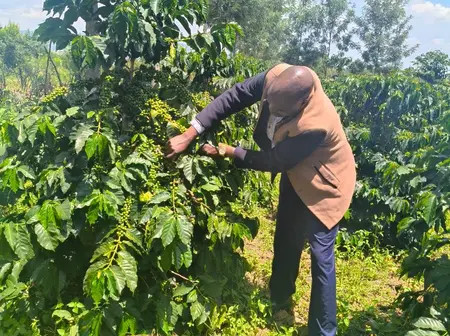Festus Bett, a coffee farmer from Kericho, moves with the practiced grace of someone who has spent eight years tending his land. He bends over a line of coffee bushes, his hand brushing across the green cherries. “This coffee takes more than six months before I can harvest it,” he says. “It’s not something you rush, just like the systems that support us shouldn’t be rushed either.”
Bett, a smallholder farmer from the Kipkelion Coffee Cooperative Society, shares the apprehension of thousands across Kenya as they confront the looming implementation of the government’s Direct Settlement System (DSS).
Initially introduced as a way to eliminate corruption and speed up payments by bypassing marketing agents and cooperatives, the DSS is a payment model where proceeds from coffee sales go directly from the buyer to the farmer’s account. But what began as a plan for transparency is now, in the eyes of many, a threat to the very institutions that sustain Kenya’s coffee economy.
Bett believes the DSS has been hijacked from its original intent. “When it was first introduced, it was supposed to pay farmers through societies, still giving them a voice and structure. But now they want to strip even that away,” he says. For him, the issue is deeply personal. “I depend fully on my cooperative. They buy farm inputs for us, distribute them, pay school fees for my children, and handle our loans. If coffee money starts going directly into my account, where I don’t even have a dollar account, what will happen to those services?”
He argues the system fails to consider the complex services cooperatives provide and is riddled with practical flaws. “If they pay me Ksh 3,000 directly, what can I do with it? The cooperative aggregates that money to help us manage the full cycle of farming,” he explains. “We’ve already seen cases where money goes to the wrong person because the system can’t detect who actually delivered coffee if farmers harvest at different times.” Bett is frustrated by the government’s selective focus, asking, “There are eight pillars in the Coffee Regulations. DSS is the only one. Why are we picking one pillar and leaving the rest?”
This sentiment is echoed in Bungoma County by Joseph Ngomat, a coffee farmer since 1995. He believes the DSS undermines the cooperative structure and that the sector’s problems stem from politicization. “The problem with coffee farming now is that officials have turned it into a political tool,” he says. He describes a system still riddled with cartels that leave farmers with peanuts for their hard work. Since the DSS began, he has experienced delays in payment and warns of double taxation. “This process was done without involving the farmer. There was no public participation,” Ngomat insists. “Cooperatives are being excluded from the value chain. The farmer is just a puppet.”
The legal grounds for the system are also in question. Gathoni Wamuchomba, a lifelong coffee farmer and Chairperson of the Coffee Parliamentary Caucus, recalls that Parliament nullified the DSS in 2022 after public uproar. “Now it’s being revived through a backdoor circular from the Ministry of Cooperatives. That is unconstitutional,” she declares. While she acknowledges the original goal of accountability was laudable, she warns the new implementation is “different and dangerous.” She fears the collapse of the cooperative system, asking, “How do you sue your own client?” in reference to a bank now suing a cooperative. “We are telling the President to treat coffee as a national heritage crop, not a political token.”
The potential collapse is not theoretical. Felix Mureithi Mwai, National Chairperson of the National Cooperative Coffee Unions of Kenya (NACCU), warns that a recent circular mandating direct payments “threatens to kill our cooperatives.” He explains that coffee farming is a continuous, resource-heavy process from flowering to milling, and cooperatives support farmers throughout that entire cycle. Bypassing them will strip farmers of vital services, saddle them with high costs, and exclude vulnerable farmers who lack phones or bank accounts. “The cooperatives are embedded in these communities. They know the farmers personally. DSS ignores that,” Mwai says.
Back in Kericho, Festus Bett believes the answer lies in reforming cooperatives, not destroying them. “If there are corrupt officials, punish them. Regulate us. But don’t burn down the whole system,” he pleads. The community is already feeling the strain; a recent small sale was too little to cover all his needs, and without the cooperative to cushion them, his children risked dropping out of school. His frustration points toward desperation: “If the government forces this, we’ll sell our coffee on the streets. We’ll bypass everyone because no one can dictate where our money goes.”
This growing resistance has led to action. Ngomat calls for the total cancellation of the DSS, demanding meaningful public participation. NACCU and farmer representatives have drafted a memorandum to present to President William Ruto, urging him to halt the rollout and begin inclusive consultations.
The stakes could not be higher. Coffee is more than a crop in Kenya; it’s an identity and a vital economic pillar. In 2023, the country exported over $300 million worth of coffee, supporting nearly 800,000 smallholder farmers. “If those societies die,” Wamuchomba warns, “you don’t just lose coffee. You lose families, schools, livelihoods, and heritage.” As the debate rages and a new harvest season approaches with no clarity, anxiety hangs thick in the air over the farms. Festus Bett’s words serve as a final caution: “Coffee doesn’t grow overnight. Neither should policies that affect our future.”

Leave a Reply